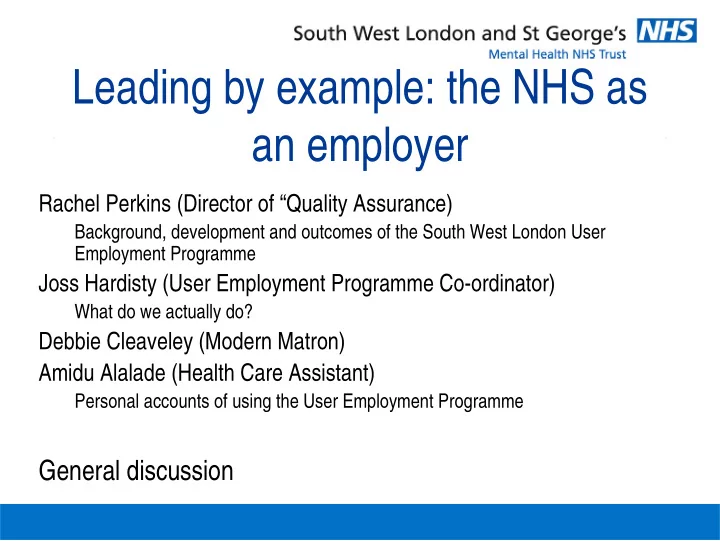

Leading by example: the NHS as an employer Rachel Perkins (Director of “Quality Assurance) Background, development and outcomes of the South West London User Employment Programme Joss Hardisty (User Employment Programme Co-ordinator) What do we actually do? Debbie Cleaveley (Modern Matron) Amidu Alalade (Health Care Assistant) Personal accounts of using the User Employment Programme General discussion
Why employ people with mental health problems in mental health services? • Provides much needed employment opportunities • Leading by example: NHS is a major employer, not just a service provider • People who have successfully lived with mental health problems have expertise that is valuable to others who are facing a similar challenge • Counteracts despair and pessimism: offers images of possibility to both service users and staff • Breaks down ‘them’ and ‘us’ divide
South West London User Employment Programme – established 1995 Designed to increase access to employment in mental health services for people who have themselves experienced mental health problems – employment in ordinary existing positions on the same terms and conditions as everyone else
Types of objections raised • ‘What about transference – will they be objective?’ • ‘What about confidentiality? They will have access to people’s psychiatric records’ • ‘Mentally ill people will be taking our jobs’ • ‘Won’t they be unreliable?’ ‘Won’t they be off sick all the time?’ • ‘Won’t they be dangerous – a risk to clients?’ • ‘What happens if they go mad at work?’ • ‘We won’t be able to tell jokes in ward rounds any more’
A supported employment programme Between 1995 and 2009 185 people with mental health problems have been supported to work in the Trust – diagnosis: 41% (75 people) depression, 28% (52 people) schizophrenia, 16% (30 people) bipolar disorder (81% >= 1 psychiatric admission) – 66% in clinical positions, 27% administrative/managerial, 7% support services – 22% in posts requiring professional mental health qualification At 1 st April 2009 41 continued to receive support, 144 did not – Of those no longer receiving support: • 76 people (53%) working in Trust without support • 36 people (25%) working outside the Trust • 12 people (8%) moved on to further training/education • 20 people (14%) unemployed
But The supported employment programme suggested that people with mental health problems could work in mental health services but only if they had the proper support – For many the only barrier to employment is employers ’ reluctance to take them on – Many can obtain the support they need from friends and services outside the workplace
A Charter for the Employment of People who have Experienced Mental Health Problems Designed to: • decrease employment discrimination against people with mental health problems throughout the organisation • recognise the important contribution that people with mental health problems can make to the work of the organisation – Personal experience of mental health problems ‘desirable’ on person specifications for all posts – Advertisements encourage people with mental health problems to apply – Confidential equal opportunities monitoring includes mental health problems
Beware - if you come to work in South West London you don’t know whether your colleague (or your boss) is one of ‘them’ or one of ‘us’ Every year since 1999 at least 15% of recruits have personal experience of mental health problems In 2007 24% had mental health problems And the higher up you go the more of them you find ...
Recruits with mental health problems 2007 35% 31% 30% 23% 25% 22% 21% 20% 15% 10% 5% 0% Band 1-4 Band 5-7 Band 8-9 All recruits
Reinventing the wheel? In late 18th century France at Bicetre Hospital there was a policy of seeking staff from among ‘ recovered and convalescing ’ patients Pinel: because of their own experiences such people are better placed to understand and respond sensitively to the problems of patients
What help do we actually provide in the supported employment programme? • Support to people who want to apply for jobs in the Trust – Assistance in job search – Assistance in the recruitment process and transition to work – Ongoing support to employees and managers – ‘Reasonable adjustments’ in the work setting • Support to existing employees who develop mental health problems – Assistance to return to work – Negotiation with/support to managers – Support for as long as the person needs – ‘Reasonable adjustments’ in the work setting
Support to people who want to work in the Trust • Assistance in job search – Information about the range of jobs available – Assistance to match individual qualifications and aspirations with posts in the Trust – Distribution of vacancy bulletins and assistance to access ‘NHS Jobs’ • Assistance in the recruitment process – Assistance to complete application forms and make the most of experience – Information about user Employment programme and what we can offer with all job packs on ‘NHS Jobs’ – Interview preparation/practice – Information about occupational health – Help in the transition into work (including accessing specialist benefits advice) – Liaison with Occupational Health and Human Resources
• Ongoing support to the individual – Help with difficulties that arise at work – Practical assistance – Help to access other services – Coping with specific symptoms – Adjustments at work • Support to managers – Advice on recruitment (including what sort of questions to ask at interviews) – Advice on adjustments the person may need (including graded plans for returning to work – Support when problems arise – ‘Mediation and review’ – three way meetings where necessary to resolve problems
Experience of Using the Programme • Debbie Cleaveley, Modern Matron • Amidu Alalade, Health Care Assistant
Recommend
More recommend